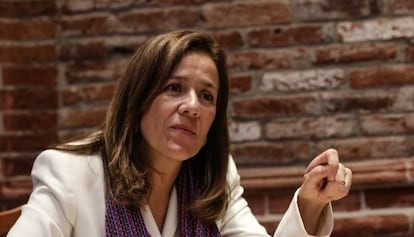Margarita Zavala: “President Peña Nieto has a tamed opposition”
Wife of ex-Mexican leader Felipe Calderón says she will run in the 2018 presidential race


In Mexico’s poker match of politics, former first lady Margarita Zavala is betting everything on one card.
One week after the midterm elections, which gave the ruling Institutional Revolutionary Party (PRI) and its allies a majority in the Chamber of Deputies, the wife of former president Felipe Calderón (2006-2012) has announced her intention to seek the presidency herself in 2018 as candidate for the conservative National Action Party (PAN).
People will soon get to know Felipe Calderón as Margarita Zavala’s husband”
The 47-year-old Zavala is reaching for the highest office in Mexico without having climbed the political ladder in the traditional way or having control over her party. She will either triumph or fail spectacularly – and she knows it.
Zavala now has three years to achieve her goal and try to escape from her husband’s shadow, and the discontent he evoked by waging a bloody war against organized crime, which left 70,000 people dead during his six-year term.
Question. You are better known as former President Calderón’s wife rather than for your work. What do you think about that?
Answer. That’s inevitable. But the question is whether that’s good or bad. During the six-year administration, I made my own decisions and never had any regrets. People will soon get to know Felipe Calderón as Margarita Zavala’s husband.
Q. Your husband launched a brutal war against organized crime that left 70,000 people dead and 23,000 others missing. How do you look at that?
A. You just couldn’t get around the problem, and that was one of the tragedies.
The government had no other option but to deal with organized crime the way it did”
Q. But how do you judge what occurred? Would you do the same thing?
A. We need to confront organized crime.
Q. Yes, but in the same manner?
A. The government had no other option but to deal with organized crime the way it did. At the same time, reforms were introduced to strengthen institutions and introduce a comprehensive strategy. A lot of the infighting among gangs occurred because of law enforcement operations.
Q. But were there abuses on the part of law enforcement?
A. No matter where these abuses took place, the government has to take action. While it sometimes isn’t easy or clear to see whether abuses occurred, all human rights violations must be punished.
Q. If you win the presidency would you continue with the same policies?
While it sometimes isn’t easy to see whether abuses occurred, all human rights violations must be punished”
A. The circumstances are different now.
Q. What’s your opinion of President Enrique Peña Nieto?
A. It is incredible what happened during the midterms. The results do not correspond to the low approval ratings he has. He had no courageous or clear opposition – only a tamed one. Up until the point that he suffered for it, because if you don’t have a counterweight, you don’t alter your decisions. This has been harmful to the country.
Q. Ever since President Vicente Fox’s victory in 2000, the PAN has been losing its electoral base.
A. The goal of the PAN was to get closer to the citizens, but instead it got mixed up in its own internal affairs. We were all involved.
Q. What is your relationship to PAN president Gustavo Madero?
A. We haven’t had any kind of relationship for some time. He only deals with his own small group. His personal way of handling things has been a disappointment.
The results of the midterms do not correspond with the president’s low approval ratings”
Q. Why did you decide not to keep on fighting for the PAN leadership?
A. If I were to put all my energy into the PAN, a confrontation would be inevitable. The other possibility I had was to go outside the PAN, to choose not to go for internal control, and instead meet with indigenous communities, small businesses and cooperatives. It was a question of being at the center of the PAN or at the center of Mexico.
Q. Does this mean you are willing to file your candidacy without the PAN?
A. No, but if the PAN doesn’t get closer to the citizens, it won’t win.
Q. Are you not risking burning yourself by announcing your candidacy three years before the elections?
If the PAN doesn’t get closer to the citizens, it won’t win”
A. Politics is risky, but my life has always been so much in the public eye that it doesn’t scare me. There is no reason for me to get burned.
Q. Are you fed up with the way politics is run in Mexico?
A. Nobody likes the way politics is run in Mexico today.
Q. What do you think of the new governor of Nuevo León, Jaime Rodríguez Calderón, El Bronco, who ran as an independent and won?
A. I have always liked independent candidates because they are a necessity in a democracy. But we are going to have to wait to see how he governs.
Q. And what about Podemos in Spain?
A. When political parties don’t respond to citizens’ needs real social movements emerge, but they don’t offer the clarity that’s desired for stability. It’s a message that demonstrates the need for a new kind of politics.
I don’t support legalization of abortion but I also don’t believe women should be punished for having one”
Q. Are you in favor of legalizing drugs?
A. This is an issue that has to be dealt with on a regional basis. You can’t resolve it with a “yes” or a “no.” If you just legalize drugs as they are, you stand the chance of harming society and not reaping any benefits. But I am not frightened about discussing the issue.
Q. Are you in favor of abortion?
A. I am in favor of life and I understand the circumstances. I don’t favor legalization but then again I don’t favor that women should be punished for having an abortion.
Q. Are you scared of drug traffickers?
A. If you are on the side of honesty, you have to confront organized crime.
Tu suscripción se está usando en otro dispositivo
¿Quieres añadir otro usuario a tu suscripción?
Si continúas leyendo en este dispositivo, no se podrá leer en el otro.
FlechaTu suscripción se está usando en otro dispositivo y solo puedes acceder a EL PAÍS desde un dispositivo a la vez.
Si quieres compartir tu cuenta, cambia tu suscripción a la modalidad Premium, así podrás añadir otro usuario. Cada uno accederá con su propia cuenta de email, lo que os permitirá personalizar vuestra experiencia en EL PAÍS.
¿Tienes una suscripción de empresa? Accede aquí para contratar más cuentas.
En el caso de no saber quién está usando tu cuenta, te recomendamos cambiar tu contraseña aquí.
Si decides continuar compartiendo tu cuenta, este mensaje se mostrará en tu dispositivo y en el de la otra persona que está usando tu cuenta de forma indefinida, afectando a tu experiencia de lectura. Puedes consultar aquí los términos y condiciones de la suscripción digital.








































